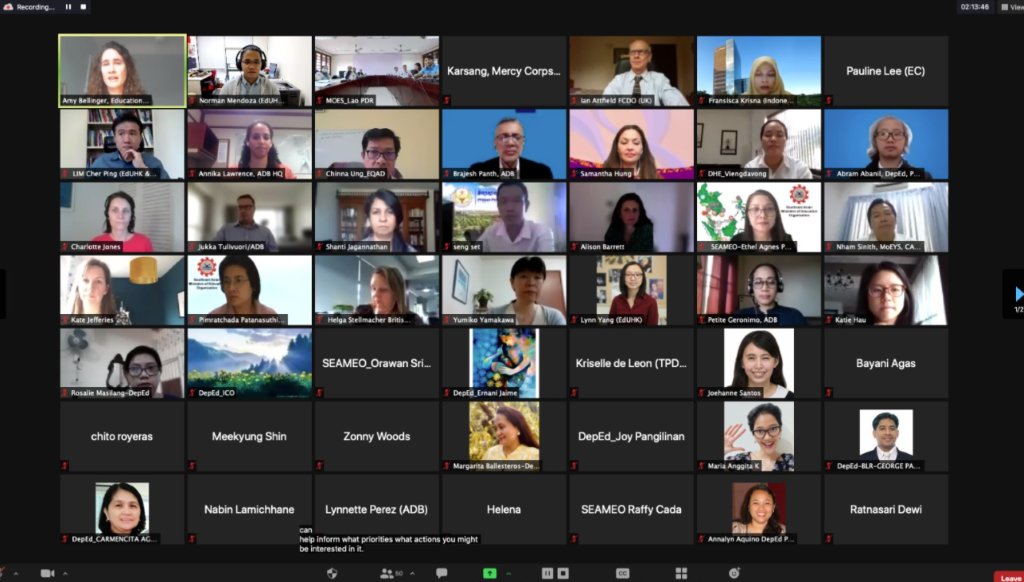The TPD@Scale Coalition for the Global South led a two-day policy dialogue (23 and 25 March 2021) for diplomats, ministers, and high-level officials from developing Southeast Asian nations, in partnership with the Education Commission. Co-hosted by the Asian Development Bank (ADB) and the UK Foreign and Commonwealth Development Office (FCDO), the event focused on how participating countries can contextualize and implement the evidence-informed action areas in service of the marginalized.
The event featured three core white papers highlighting a range of evidence and guidance that inform much-needed education workforce innovations. These include the Coalition’s recently-released policy brief, Designing Teacher Professional Development @Scale for Equity in Education, the #SaveOurFuture White Paper, and the Smart Buys report. Insights and action areas from these papers were presented by Professor Cher Ping Lim, one of the Advisory Board Members of the Coalition.
The six action areas derived from these papers are:
- Reinforce professional development for teachers with a range of pedagogical support strategies, for engaging girls and students from marginalised communities.
- Design professional development of the education workforce for scale (i.e., TPD@Scale), for greater impact on quality of learning, while localising it for inclusion.
- Create student-centred learning teams, leveraging parental and community support to ensure inclusion of girls and marginalized students and to accelerate their learning.
- Use data-driven approaches to improve the number of female leaders and encourage the leadership of girls especially in STEM.
- Support school and district leaders to provide instructional leadership and enhance teacher capacities for a post-COVID environment, including for meeting the learning needs of girls and the most marginalized.
- Enhance the long-term sustainability of the education workforce with cross-sector partnerships that will serve the learning of girls and the most marginalized students.
How can innovations across the education workforce support the learning of girls & marginalized students in SE Asia? We discussed the big ❓ with policymakers in Cambodia, Indonesia, Laos & the Philippines at our #EduWorkforceSEAsia event.#SaveOurFuture @savefuturenow @FCDOGEC pic.twitter.com/yZcIgax4Bl
— Education Commission (@educommission) March 23, 2021
In addition to education workforce innovations that support the learning of girls and marginalized students, Day 1 presentations highlighted case studies that call for a collaborative and holistic approach for improving girls’ learning outcomes. To create a collaborative atmosphere to discuss and contextualize the action areas, high-level country representatives were brought to online breakout rooms for discussion. The key speakers also joined the breakout rooms to offer consultative guidance and support, and country representatives reflected on adapting the action areas in their existing country contexts.
Day 2 focused on ministerial consultation. Participants were presented with the latest international evidences on the capacity building of the education workforce and their impact on the learning of marginalized students, especially girls. Victoria Tinio, Coalition Secretariat Director, shared evidences from the Coalition’s work on strengthening education leaders and teacher capacity to improve teaching and learning for all pupils through the Philippines’ Early Language, Literacy and Numeracy (ELLN) Digital model. Other featured innovations included Global Education Evidence Advisory Panel (GEEAP)’s “Smart Buys”, which highlighted cost-effective practices to improve learning outcomes, and the Education Commission’s Save Our Future coalition, which aids in optimizing learning of marginalized girls by creating student-centered learning teams (e.g., Teaching at the Right Level or TARL).
Director Margarita Consolacion Ballesteros of the International Cooperation Office of the Philippine Department of Education summarized the discussions from the first day and enumerated three core action themes that echoed to participating countries: (1) promoting professional development at scale, (2) supporting educational leadership, and (3) building sustainable partnerships. Country representatives from Cambodia, Lao PDR, and the Philippines shared country-level points, echoing the importance of female leadership in STEM education, to create an environment where female role models are at the forefront. The two-day event ended with SEAMEO’s Director, Dr. Ethel Agnes Valenzuela, discussing the ways forward based on SEAMEO’s 2021-2030 strategic plan.

